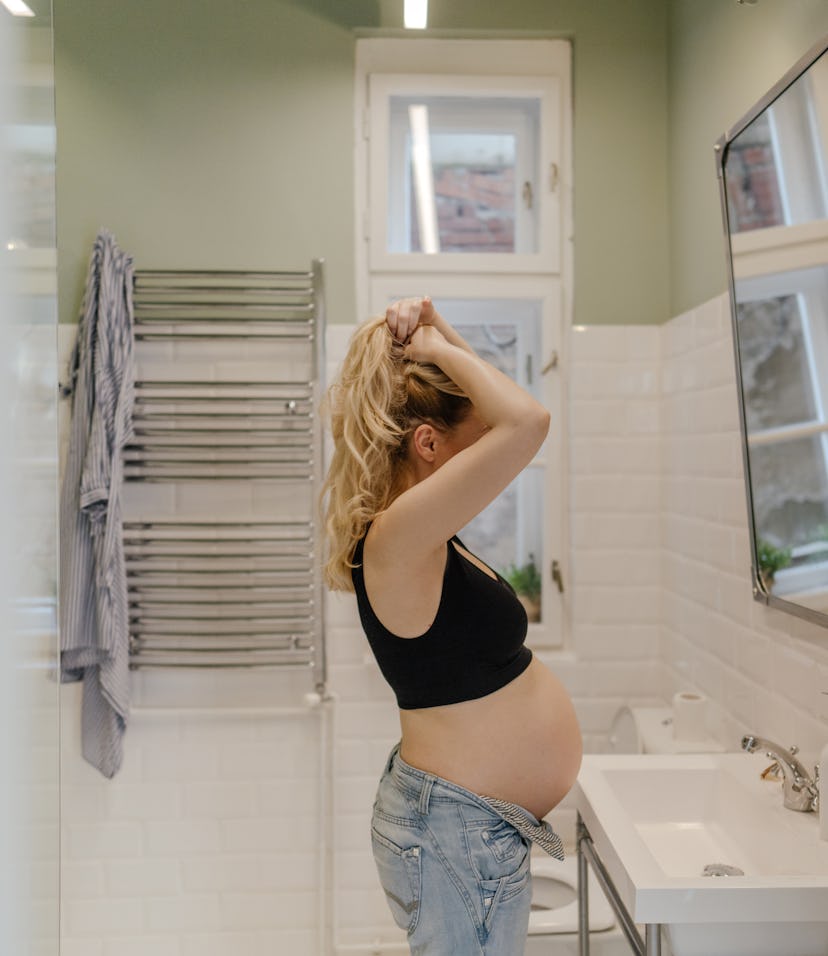Pregnancy

What You Need To Know About Using Dry Shampoo During Pregnancy
Bonus: thanks to pregnancy hormones, you may notice your roots look oilier than usual. Yay.
When you're pregnant, there is a laundry list of things you can't enjoy without risks. Your doctor will likely tell you that alcohol, sushi, and hot tubs are off-limits, but what about your favorite beauty products? Namely, is dry shampoo safe during pregnancy? After all, you need something to help hide those newly oily roots. (Because, hi, hormones.)
"Most dry shampoos are safe for use for most people, but that comes with the cautionary note to avoid overuse," Dr. Lucy Chen, a board-certified dermatologist with Riverchase Dermatology tells Romper. "Ingredients in dry shampoo vary from product to product, but basically what they use in the formulation is usually starch or alcohol to soak or dry up the excess oil. They may also have fragrances that can irritate or dry out the skin."
So can expecting moms still douse your days-old hairstyle with a magical potion to help it spring back to life just one more time before you absolutely must shower? The good news is that you can safely use dry shampoo during pregnancy, but there are a few precautions that experts say you should take.
The Safety Of Dry Shampoo During Pregnancy
"For pregnant women, dry shampoos may be convenient, especially in the time closest to their due date, because mobility and discomfort can make even the simplest of tasks tiresome," Chen says. "The recommended use is between once and twice a week at most — more than that, and you could be risking dryness, clogged pores, hair breakage, and rashes."
This is especially a concern during pregnancy when using dry shampoo can exacerbate already existing scalp irritation. "Pregnancy is a form of stress to a woman’s body and can increase inflammation. This shows up on the scalp as itching, scaling and sensitivity," dermatologist and dermatopathologist Dr. Ife Rodney, founding director of Eternal Dermatology, tells Romper. "Increased hormone production during pregnancy also means more hair growth, and increased oil or sebum production. Extra sebum blocks hair follicles, causing tender acne-like bumps, called folliculitis."
Chen tells Romper that the way that you care for your scalp can impact your hair post-pregnancy as well. "Lower-quality dry shampoos may also have damaging ingredients or ingredients that can compromise the overall health of your hair follicles, which could cause panic after the pregnancy when a new mother's hair goes into shedding," Chen says. "While the hair usually returns to normal after the shedding period, we want to make sure we are caring for our scalp in a way that optimizes the normalization of our hair health."
Choosing A Dry Shampoo During Pregnancy
When it comes to the safety of dry shampoo ingredients, both Rodney and Chen recommend that pregnant women use hair care products with few ingredients and avoid harsh chemicals.
"Pregnancy is a delicate process. Your body is going through changes to provide nutrients for your growing baby. Many controlled studies to figure out if hair and skin products can be harmful to mother or baby have not been done. Because of this lack of data, I advise my patients to err on the side of safety," Rodney tells Romper. "I recommend sticking to allergen-free, non-toxic, natural hair and skin products with as few ingredients as possible."
If you decide to use dry shampoo while you're pregnant, choosing a formula with limited ingredients that will still get the job done is key. The dry shampoos below feature various natural and clean ingredients, but are each made up of slightly different formulations.
It's worth noting that none of the dry shampoos below come in an aerosol spray like some of the more popular drugstore brands do, so they may take some getting used to. To stay safe and have a healthy head of hair and scalp during pregnancy, though, some trial and error is worth it.
We only include products that have been independently selected by Romper's editorial team. However, we may receive a portion of sales if you purchase a product through a link in this article.
Non-Toxic Dry Shampoos For Pregnancy
Experts:
Ife Rodney, MD, dermatologist, dermatopathologist, founding director of Eternal Dermatology
Dr. Lucy Chen, MD, board-certified dermatologist, Riverchase Dermatology
This article was originally published on